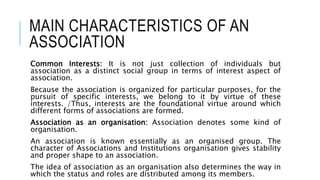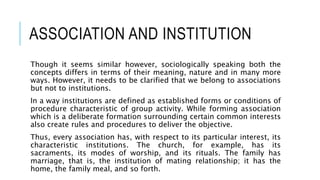The document discusses associations and institutions. It defines an association as a deliberately formed group of individuals who come together to pursue common interests through organized rules and regulations. Associations are characterized by shared interests, organization, membership, and pursuit of cooperative goals. They differ from communities, which are larger and more stable social groups. The document also defines institutions as established rules, procedures, and expectations that structure social interaction within associations and broader society. Examples include laws, education, marriage, and family. While individuals belong to associations, they do not belong to institutions themselves.





















